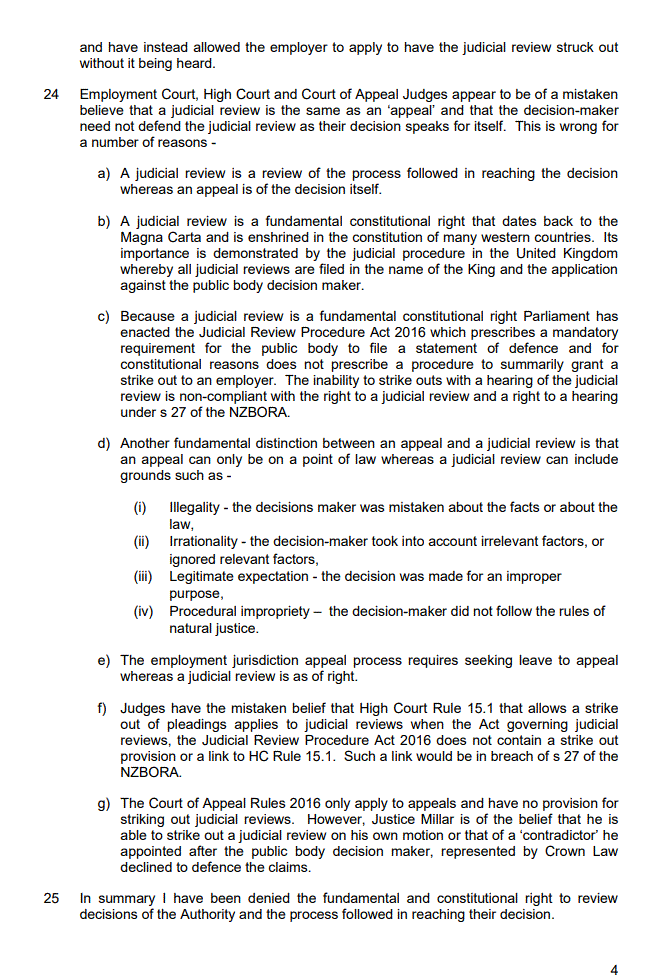Open letter from multiple SLAPP target to Ministers, Chief Judge, AG
- Kim Leighton
- Mar 30, 2024
- 3 min read

EDITOR’S NOTES:
As requested, we have redacted details of proceedings involving one large employer because it settled not long after the letter below was written by the target of several Strategic Lawsuits Against Public Participation (SLAPPs). We published an article about this in late February.
On 28 February the Employment Court ordered the target to pay an adverse costs award of $17,088.50 within 21 days to Progress to Health (PTH). The target had applied for a judicial review under the Judicial Review Procedure Act 2016. That application was to review a decision by the Employment Relations Authority (ERA) to allow a SLAPP against the target and his client, a former PTH employee, in early 2020. We note judicial activism against judicial reviews, at least in the employment jurisdiction, which appears to have spread to the Court of Appeal and Supreme Court. The ERA engaged only perfunctorily and PTH applied to have the judicial review struck out. Strikeout was granted, making PTH automatically eligible to apply for a tariff-based contribution to its legal costs. Indeed, weaponisation of legal costs is a key component of SLAPPs, which are currently illegal in 32 out of 50 American States. While the United Kingdom does not have anti-SLAPP legislation, the Solicitors Regulation Authority has warned lawyers against engaging in the conduct. PTH is a registered charity and under Section 50 of the Charities Act 2005, its conduct may amount to oppressive conduct, a form of serious wrongdoing, although we don’t know if that issue has yet been raised.
Another development is the adjournment of an Employment Court hearing that was scheduled for 5 March. The target is challenging a SLAPP brought by his last employer, Hamilton City Council. The Council had dismissed the target, then aged 62, in January 2014. We understand that the dismissal to be a whistleblower retaliation event. Things moved quickly after that – the target raised a grievance in the ERA, reached a confidential settlement, and started a business as an employment advocate specialising in workplace bullying. Seven years later the Council sued him for disparaging it and he was ordered to pay a $9,000 fine to the Crown (not the Council). The target seeks cancellation of that fine and a contribution to his legal costs. The reason for the recent adjournment was that the target had fallen out with a business associate, the director of a company he was contracting to after his own company was liquidated on application by another SLAPP bringer Rangiura Trust Board in 2022. The director had denied him access to his email account among other things, which put him at a disadvantage because he was unable to produce correspondence within those emails that would have helped his challenge.
Turuki Healthcare has applied to bankrupt the target because of his inability to pay an adverse costs award, again almost automatically generated from a strikeout of a judicial review application. We believe this is its third attempt since early 2020. If the first attempt had succeeded, it would have exposed a counsellor, who had been working on a voluntary basis when she had sent emails that were alleged to have breached a settlement agreement between the target’s client’s former employer Turuki Healthcare, to a $43,000 liability. That is because the ERA imposed the maximum of $10,000 against the target, the target’s company and the counsellor, but structured the penalties and costs as joint and several, which the Employment Court later found to be wrongful. The fact that penalties remained, albeit significantly reduced, created a precedent of enforcement of employment settlement agreements against third parties (including journalists), which is still being challenged.
The 16-page letter appears below.
(Tristam, LA)






















Comments